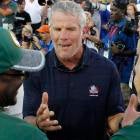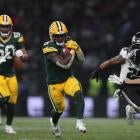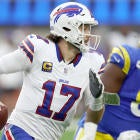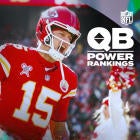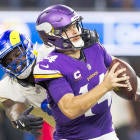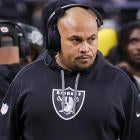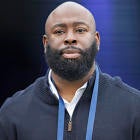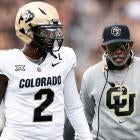The struggles of former Packers quarterback Brett Favre are well-documented. Favre, now in the Hall of Fame, has been a pretty open book as it concerns his battle with painkillers during his time in Green Bay. But as it turns out, he sought treatment multiple times over what many people believed happened.
Writing in his final MMQB column, Peter King issued a host of thank you's to different players, personnel men, etc., including Favre. King talked to Favre over the weekend for his column, and the quarterback told King he'd actually been to rehab three times during his span with the Packers, two of which no one knew about until now.
King recalled spending a week with the Packers for a Sports Illustrated cover story, hanging out at Favre's house and marveling at the quarterback's "tirelessness." Turns out, Favre was just cranked up on Vicodin. And still playing at an MVP level.
"Oh, I remember that week," Favre told King on the phone. "You thought, 'Man, this guys's high on life.' You didn't know there was a reason for it. It is really amazing, as I think back, how well I played that year. That was an MVP year for me. But that year, when I woke up in the morning, my first thought was, 'I gotta get more pills.' I took 14 Vicodin, yes, one time. I was getting an hour or two of sleep many nights. Maybe 30 minutes of quality sleep. I was the MVP on a pain-pill buzz. The crazy thing was, I'm not a night owl. Without pills I'd fall asleep at 9:30. But with pills, I could get so much done, I just figured, 'This is awesome.' Little did I know [fiancée and now wife] Deanna would be finding some of my pills and when she did, she'd flush them down the toilet."
Favre also revealed that he not only did 72 days in Kansas for rehab, but that he went to a treatment center in Louisiana a few years before that for just 28 days.
"I actually went to rehab three times. I saw the most successful, smart people -- doctors, professional people -- lose it all, ruin their lives. A year or two before you saw me, I went to a place in Rayville, La., just outside Monroe. It was pills then too," Favre recalled to King. "Deanna and [agent] Bus [Cook] talked me into it. I didn't think I had a problem, but they talked me into it. I went for 28 days. When I got out, I was able to control myself for a while. I wouldn't take anything for a day or two, and I wouldn't drink. But I was a binge drinker. When I drank, I drank to excess. So when I went in the second time, to the place in Kansas, I remember vividly fighting them in there. They said drinking was the gateway drug for me, and they were right, absolutely right, but I wouldn't admit it. I will never forget one of the nurses. I had it all figured out. I fought with this nurse all the time. I would not admit the drinking problem. At the end she said to me, 'You'll be back.'"
The nurse was correct (they usually are in these instances). And Favre found himself back in the Kansas rehab center to deal "strictly" with drinking.
"I was back. 1998. Guess who was waiting there when I walked in -- that same nurse. This time it was strictly for drinking," Favre said. "I didn't go back to the pills. I admitted my problem, I was in there 28 days, and it worked. When I got out, the toughest thing was the first three months, because I had to change my thought process. When I played golf before, I realized the only reason I wanted to play was to drink. After a while, instead of thinking, 'How many beers can we drink in 18 holes?' I fell into a pattern of what could I do to get good at golf. I realized with each passing day I really didn't like drinking."
In 2016, Favre went deep in discussions about his painkiller problem, saying he used to take 15 (!) Vicodins at a time. And that in 1996, he was at his peak painkiller usage, although he was using them very frequently before that. It would help land Favre in the league's substance abuse program as a result.
He's since dramatically changed his lifestyle. He's a grandfather now, a guy who would rather his grandkids play golf than football. Over the past decade or so, he has actually asked "Did that really happen?" about the situation, that's how foreign it feels to him.
But it did: three times. And it's a testament to the difference in the coverage of football in the 1990's versus the coverage of football in 2018 that we wouldn't find out about Favre, peaking during his career and winning three consecutive MVP awards during this span, having multiple trips to seek treatment for painkillers until more than 20 years later.








